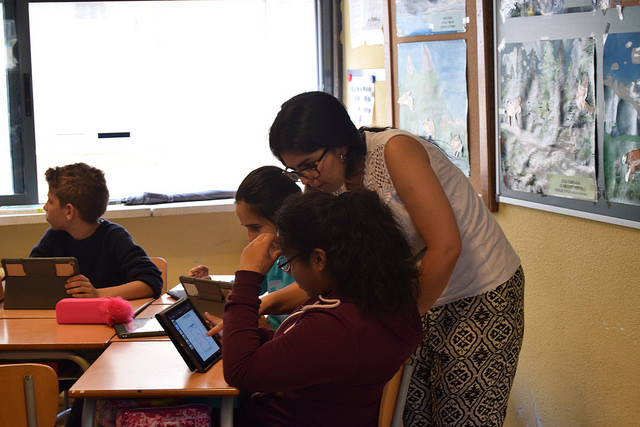One more step in our line of permanently seeking educational innovation that benefits all our students to reach their goals
Innovation
Quality
The new technologies contribute to offer a quality education for all our students, regardless of their economic resources or their social status.
Responsibility
A priority objective is to make responsible use of the device that is considered a work tool and not leisure or distraction.
One more step...
The name ACM 3.0 refers to the desire to create a new educational scenario in which digital technologies (web 2.0, web 3.0) are the most important support for access to knowledge and thus, together with the experience of classroom methodology Cooperatives provide an innovative, inclusive, comprehensive and meaningful response to the teaching-learning process This project contemplates the introduction of iPads in classrooms. For the 2017/2018 academic year, each ESO student will have a device that will be their main working tool.
Studying with a tablet does not exclude other formulas or materials such as the notebook and the agenda, which remain mandatory, although we do believe that it is a very powerful teaching-learning tool that encourages the acquisition of knowledge, access to information and , The most important, which encourages creativity and motivation. In addition, increasingly easy access to information and the use of digital terminals should help us to approach one of the key challenges in education: design personalized learning itineraries.
Finally, note that one of the aspects that we work most with our students is the responsible use of the tablet and all materials, applications and contents associated with the project. From the beginning they should consider it as a professional and academic tool and not as a means for their leisure and distraction.

- It makes it possible to transform the materials that teachers have made for years to provide them with the interactive potential that these technologies allow.
- Start the challenge of the next years: design personalized learning itineraries
- Develops students’ digital competence
- It avoids or minimizes the digital divide that is expected to open in the next few years
- Implement a more motivating methodology that uses digital technology as a tool for access to information and knowledge.
- Meeting the demand of a large group of teachers and families who, after these years, miss the positive aspects of learning in cooperative classrooms: motivation, creativity, teamwork.
- Encourage self-regulation of student learning.
- Take advantage of the new LOMCE design. The 3rd course is closer to the 1st and 2nd courses and would allow a more personalized orientation work for those students who will continue to study in FP or Baccalaureate.
- To favor the personal relationships that are established between the students themselves and with the teachers. Change a highly individualistic and competitive system for a more collaborative one where the construction of knowledge in a common way is favored.
- Provide a better climate of reflection to improve the student’s decision-making process.
- Encourage spaces and times of discussion and creation. Take advantage of classroom work more effectively.
- As human resources, the project began with more than 30 teachers and the support of the management team, the Department of Orientation and the Therapeutic Pedagogy.
- As material resources we have: individual iPADs for each student and teacher, multimedia equipment in classrooms, wiring and wireless connection, projection guns, etc.
A training plan for teachers has been carried out in areas such as cooperative methodology, multitasking and multiple intelligences, work by projects, evaluation as well as specific technology for iPADs. Also the families involved in the project have received specific training in classroom work, security, application management, etc.



